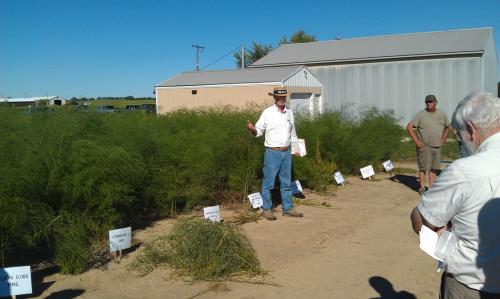Michigan State University faculty research aims to equip growers with new tools to manage asparagus
Asparagus growers look to Michigan State University for advancements in the crops production.
West Michigan vegetable growers are experts at producing asparagus, consistently placing Michigan among the top three states nationally in asparagus production. Michigan State University Extension and facility staff members have the privilege to collaborate with these growers to research new tools for managing this important vegetable crop. Results of this work were showcased at the 2013 Oceana Research Tour in Hart, Mich. earlier this year.
One focus of recent work by MSU faculty members is the use of irrigation to deliver not only water but also insecticides to asparagus. Dan Brainard, assistant professor of horticulture, and his graduate student Ben Byl have been collecting data that suggest that both subsurface drip and overhead irrigation can improve asparagus yields in dry years. Their work suggests that subsurface drip irrigation increases soil moisture deeper into the soil profile, providing a significant yield benefit for deeper rooted varieties such as some ‘Jersey’ cultivars. Overhead irrigation increases water at shallower soil depths, matching the water demand of more shallowly rooted varieties such as ‘Millennium.’ Zsofia Szendrei, assistant professor of entomology, is examining the use of subsurface drip irrigation for another purpose — delivery of systemic insecticides to plants, which she has found can reduce asparagus miner damage. Her lab is also conducting research on natural enemies of this pest, which include tiny wasps that parasitize and kill over 30 percent of asparagus miners, whose tiny larvae damage asparagus.
Plant diseases are a major challenge that asparagus growers -- and Michigan vegetable growers in general -- must deal with every year. Mary Hausbeck, plant, soil and microbial sciences professor at MSU, is collecting data to evaluate new fungicides that could be added to existing rotations to control asparagus rust, a major fungal disease that reduces yield. In addition to researching new fungicides, her lab is also conducting work that ultimately could allow targeted application of these products when conditions are good for rust to develop. The use of in-field weather stations and disease models has allowed growers to reduce fungicide applications for purple spot, and this approach is now being applied to another disease of asparagus.
Selection of good varieties suited to Michigan conditions is another key to successful asparagus production. Michigan hosts a unique asset in this regard — the Michigan Asparagus Industry Research Farm — which is funded by growers and handlers and hosts collaborative research. Varietal work at the research farm has played a big role in helping the industry identify and adopt use of new high yielding, all-male varieties. The research farm also hosts herbicide trials conducted by Bernie Zandstra, horticulture professor at MSU, which help identify new tools for managing difficult weed species. The research farm is a truly collaborative endeavor that exemplifies what can be accomplished when the agricultural industry partners with land-grant universities to help keep our growers doing what they do best -- producing high quality vegetables.
Ben Werling is a Michigan State University Extension vegetable educator in western Michigan. He can be contacted at werlingb@anr.msu.edu.

John Bakker, Michigan Asparagus Advisory Board executive director, discusses asparagus variety trials with attendees at the Michigan Asparagus Industry Research Farm, which hosts collaborative research conducted with MichiganStateUniversity faculty members.



 Print
Print Email
Email

